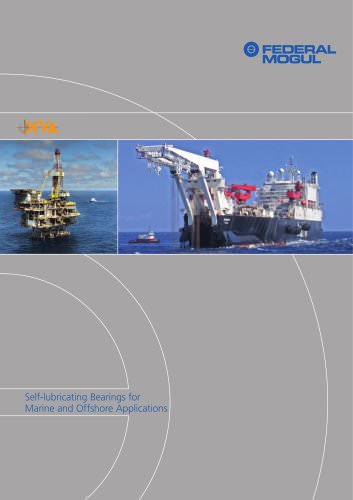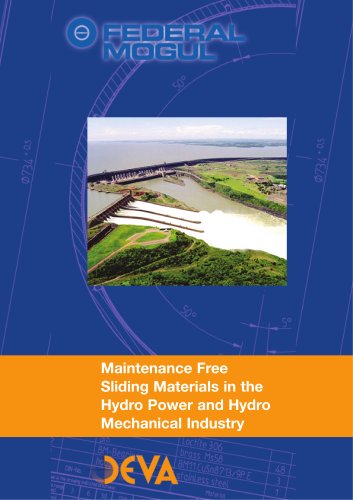 Website:
Federal-Mogul Deva GmbH
Website:
Federal-Mogul Deva GmbH
Group: Tenneco Group
Catalog excerpts
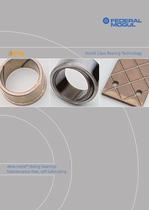
World Class Bearing Technology deva.metal® sliding bearings Maintenance-free, self-lubricating
Open the catalog to page 1
deva.metal ® High performance material – Solid lubricants embedded in metal matrix Modern designs place huge demands on today‘s bearing materials, requiring zero maintenance even under severe to extreme operating conditions and maximum loads. Moreover, the permanent cost pressure calls for increasing uptime availability of machines and plants and uncompromising standards of operational reliability. With the DEVA range of maintenance-free, self-lubricating, heavy-duty friction materials it is possible to produce selflubricating bearings with guaranteed long-term reliability. deva.metal...
Open the catalog to page 2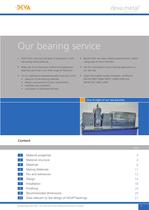
deva.metal ® maintenance-free Our bearing service Profit from more than 60 years of experience in selflubricating sliding bearings Benefit from the latest material developments, tested using state of the art facilities Make use of our extensive material and application expertise spanning a very wide range of industries Ask for a simulation of your bearing application on our test rigs Let Expect the highest quality standards, certified to DIN ISO 9001:2008, ISO/TS 16949:2009 and DIN EN ISO 14001:2004 our application engineering team assist you in the selection of the bearing materials...
Open the catalog to page 3
1 Material properties deva.metal® is a family of high performance, selflubricating bearing materials. The deva.metal system is based on four main groups – bronze, iron, nickel and stainless steel – each containing dry solid lubricant, most commonly graphite, uniformly dispersed within the metal matrix. Important selection criteria are the sliding speed, specific load, temperature and other application specific influences. deva.metal normally requires no lubrication. provides maintenance free operation. has high static and dynamic load capacity. has good frictional properties with negligible...
Open the catalog to page 4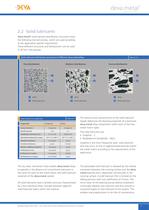
deva.metal ® maintenance-free 2.2 Solid lubricants deva.metal® solid lubricant distribution structures show the following microstructures, which are used according to the application-specific requirement. These different structures and distributions can be used in all four main groups. Solid lubricant distribution structures of different deva.metal alloys Fine distribution Figure 2.2.1 Medium distribution Coarse distribution 1 1 1 2 2 2 1 Alloy 1 Alloy 1 Alloy 2 Solid lubricant 2 Solid lubricant 2 Solid lubricant Solid lubricants properties Properties Crystal structure Specific gravity...
Open the catalog to page 5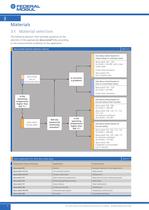
3 Materials 3.1 Material selection The following decision chart provides guidance on the selection of the appropriate deva.metal® alloy according to the environmental conditions of the application. deva.metal material selection scheme Figure 3.1.1 Use deva.metal based on nickel alloys or stainless steel Yes Check heat resistance deva.metal 124: use in liquids only deva.metal iron or iron/nickel alloys Is corrosion a problem? Yes No Is the operating temperature higher than 350 °C ? Yes Yes Will the material be chemically attacked ? Use deva.metal based on iron or iron/nickel alloys...
Open the catalog to page 6
deva.metal ® maintenance-free 3.2 Chemical resistance The following table indicates the chemical resistance of the deva.metal® bronze alloys to various chemical media. It is recommended that the chemical resistance of the selected deva.metal alloy is confirmed by testing. Definitions – Resistant Resistant depending on construction, oxygen content, temperature, etc. Not recommendable No data available Chemical resistance of deva.metal Medium / chemical substance Table 3.2.1 Conc. Temp. Bronze alloys Iron alloys in % in °C deva.metal deva.metal 101-117 Nickel alloys deva.metal 118-119 120-121...
Open the catalog to page 7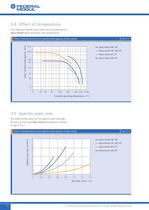
3.4 Effect of temperature The maximum specific load which can be supported by deva.metal® alloys decreases with temperature. Static constant load capacity [MPa] Effect of temperature on the specific load capacity of deva.metal Figure 3.4.1 300 deva.metal 128, 129 200 0 deva.metal 118, 120 -123 deva.metal 101-117 deva.metal 124-127 100 80 50 30 20 10 0 0 20 30 50 100 200 400 600 1000 Constant operating temperature [°C] 3.5 Specific wear rate – The effect of pU-factor on the specific wear rate (∆Sh) for each of the three deva.metal alloy groups is shown in figure 3.5.1. Effect of temperature...
Open the catalog to page 10
deva.metal ® maintenance-free 4 Mating material The deva.metal sliding materials can only be used with counter material hardness of at least 180 HB. If an additional lubricant is introduced into the sliding contact, hardness values of >130 HB are also admissible. In abrasive environments, a hardened 35 HRC/45 HRC surface should be used. Surface roughness Figure 4.1 VS – Specific wear Influence of mating material surface roughness on the microwear of composite (Model representation, based on various tests and studies) The ideal mating surface roughness for deva.metal is Ra = 0.2 to 0.8 µm...
Open the catalog to page 11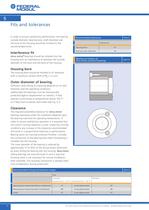
5 Fits and tolerances In order to ensure satisfactory performance, the bearing outside diameter, bearing bore, shaft diameter and the bore of the housing should be finished to the recommended limits. Recommended tolerances Table 5.1 Tolerances deva.metal® bearings should be installed into the housing with an interference fit between the outside diameter of the bush and the bore of the housing. H7 Bearing outer diameter Interference fit Housing bore r6 Mechanical fixation of deva.metal cylindrical bearings Figure 5.1 Housing bore The housing bore should be finished to H7 tolerance with a...
Open the catalog to page 12
deva.metal ® maintenance-free Machining allowance for precision bearings Bearing width Precision bearings with an assembled bore tolerance of IT7 or IT6 are obtained by finish machining the bearing bore after assembly in the housing. In this case a machining allowance of 0.15 - 0.2 mm is recommended. Wall thickness The bearing wall thickness must be sufficient to meet both the manufacturing and application strength requirements. Table 5.3 gives the recommended minimum wall thickness for deva.metal® bearings according to the specific load and bearing diameter. Wall thickness of deva.metal...
Open the catalog to page 13All Federal-Mogul Deva GmbH catalogs and technical brochures
-
deva_metal_EN
21 Pages
-
deva_glide_EN
17 Pages
-
deva_tex_EN
32 Pages
-
deva_bm_EN
32 Pages
Archived catalogs
-
DEVA Spherical Bearings
32 Pages
-
deva.bm technical handbook
24 Pages
-
deva.glide technical handbook
20 Pages
-
deva.tex technical Handbbok
20 Pages
-
Product Range
12 Pages










